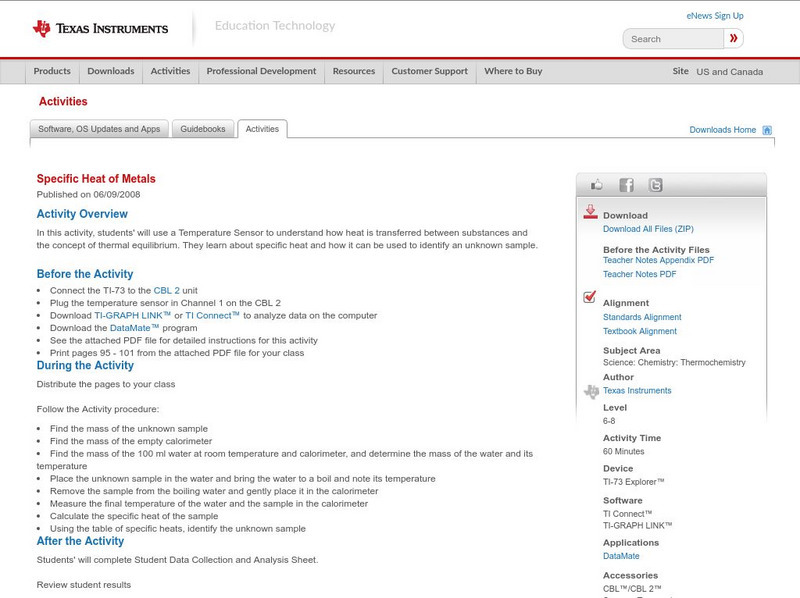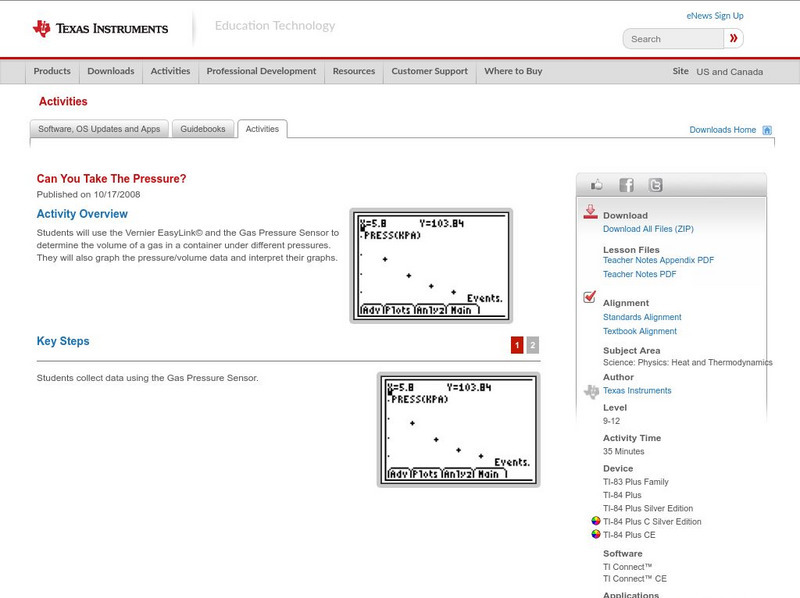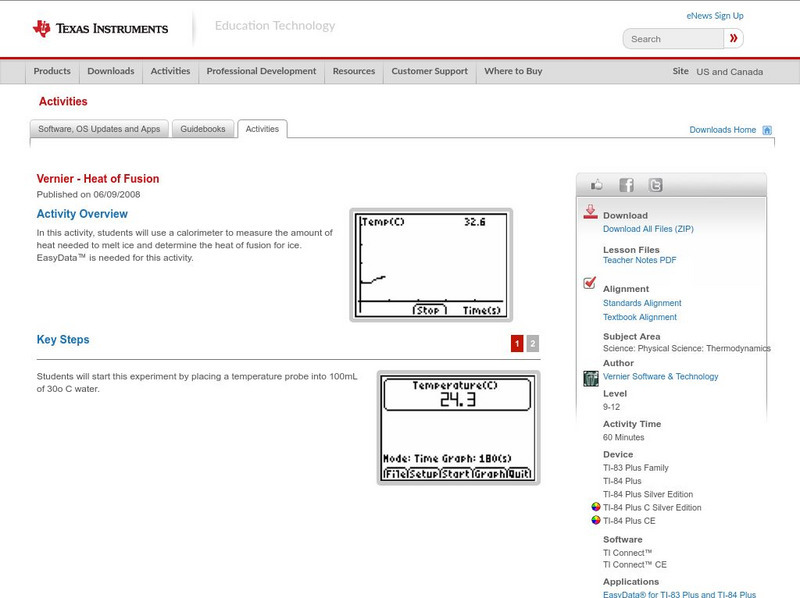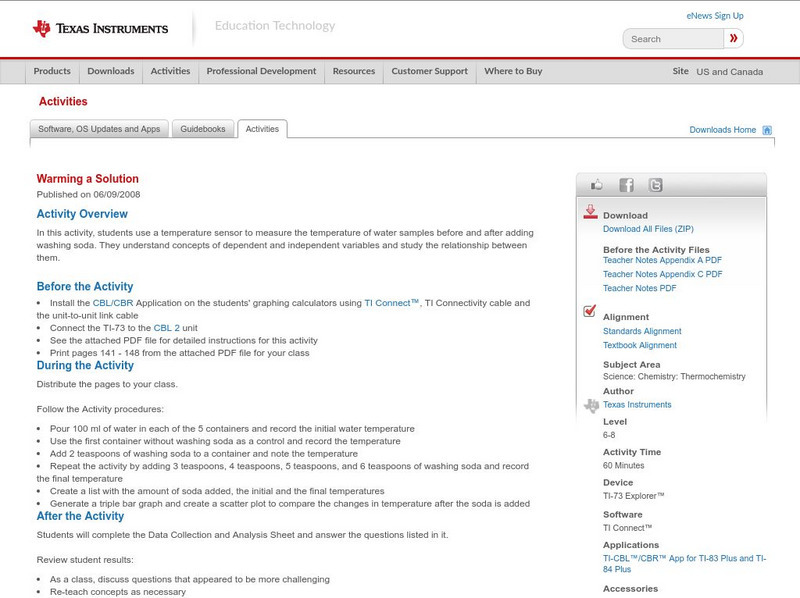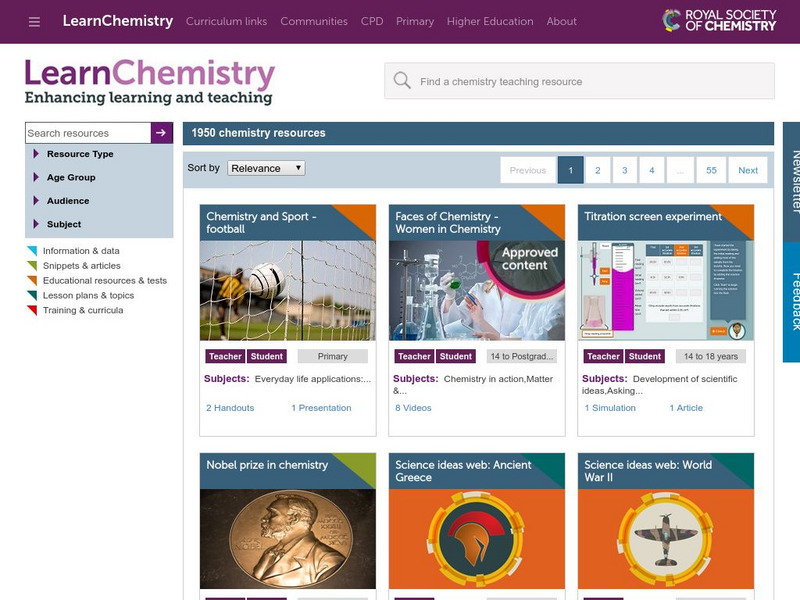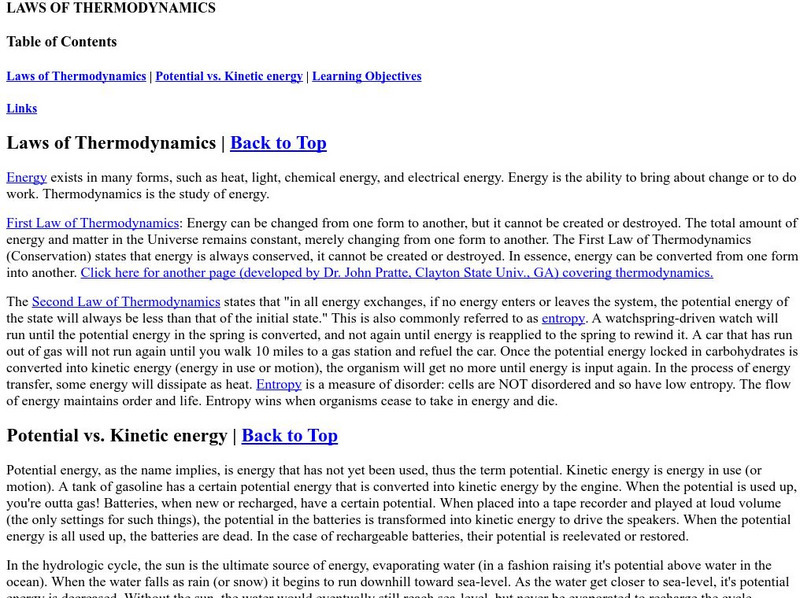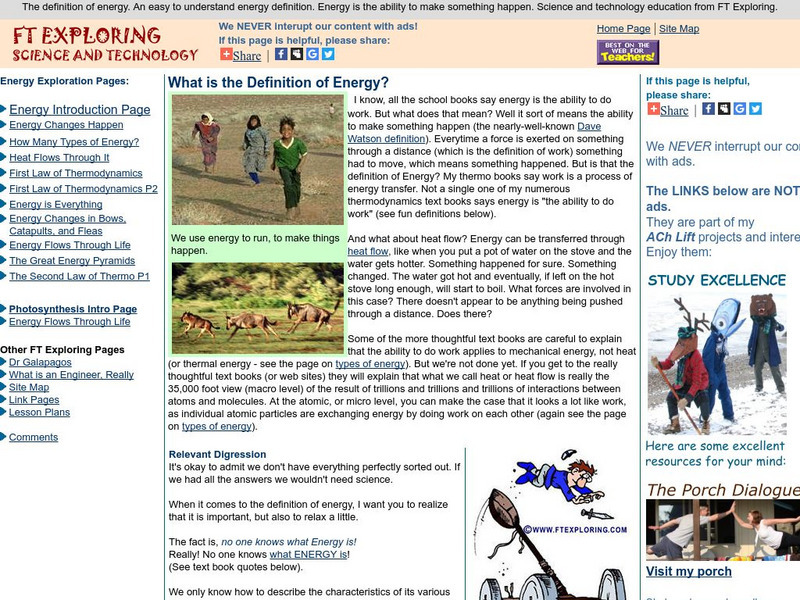Texas Instruments
Texas Instruments: Specific Heat of Metals
In this activity, students' will use a Temperature Sensor to understand how heat is transferred between substances and the concept of thermal equilibrium. They learn about specific heat and how it can be used to identify an unknown sample.
Texas Instruments
Texas Instruments: Can You Take the Pressure?
In this activity you will: Use the EasyLink and the Gas Pressure Sensor. Determine the volume of a gas in a container under different pressures. Graph pressure/Volume data. Interpret the graphs.
Texas Instruments
Texas Instruments: Heat of Fusion
In this activity, students can use a calorimeter to measure the amount of heat needed to melt ice and determine the heat of fusion for ice. EasyData is needed for this activity.
Texas Instruments
Texas Instruments: Warming a Solution
In this activity, students use a temperature sensor to measure the temperature of water samples before and after adding washing soda. They understand concepts of dependent and independent variables and study the relationship between them.
Texas Instruments
Texas Instruments: Solar Cookers and Easy Data
Students use a TI-84, Easy Temp and Easy Data to measure the quality of solar cookers. Hot dogs are heated under the May sunshine after students design, build and test their own solar cookers.
Texas Instruments
Texas Instruments: Designing Hot and Cold Packs
in this activity, students calculate the molar enthalpy of dissolving for three ionic solids, and use this information to design a cold pack. In this experiment they measure the heat changes which occur from various salts dissolving in...
Texas Instruments
Texas Instruments: How Cool Are You?
In this activity, students collect and analyze data on a model of the perspiration process.
Texas Instruments
Texas Instruments: How Low Can You Go?
In this activity, Students can use an EasyTemp temperature probe to determine the normal melting temperature of ice. They will then study how the addition of salt to the melting ice affects its melting temperature. They will finally...
Science Education Resource Center at Carleton College
Serc: Energy Changes During a Reaction: Exothermic, Endothermic
A demonstration to introduce energy changes during reactions, and to promote discussion regarding exothermic and endothermic reactions, enthalpy, spontaneity, system, and surroundings.
Science Education Resource Center at Carleton College
Serc: Popping Up Some Fun!
In this hands-on activity, students will investigate the properties of popcorn and discover what makes popcorn pop. They will compare popped and unpopped corn and hypothesize about why popcorn pops, discovering that popcorn pops because...
Science Education Resource Center at Carleton College
Serc: Investigating Diffusion of Molecules in Liquid
Scientific inquiry activity where students investigate how molecules move in liquid. They will observe that molecules in liquid move in a random manner and that heat will increase and cold will decrease the speed of molecular movement in...
Simon Fraser University
Chem1 Virtual Textbook: The Physical Meaning of Entropy
With an overview of topics related to chemical equilibrium, this site provides a foundation to a study of thermodynamics and its relation to entropy. Other topics covered include entropy and disorder, absolute entropies, and more.
Simon Fraser University
Chem1 Virtual Textbook: What Is a Heat Engine and Why Should You Care?
With an overview of topics related to chemical equilibrium, this site provides a foundation to a study of thermodynamics and heat engines. Other topics covered include the fall of heat, nuclear plants, and more.
Simon Fraser University
Chem1 Virtual Textbook: Colligative Properties of Solutions
With an overview of topics related to chemical equilibrium, this site provides a foundation to a study of thermodynamics and colligative properties. Other topics covered include osmotic pressure, entropy, free energy, and more.
Royal Society of Chemistry
Royal Society of Chemistry: Learn Chemistry: Resources for Students
Search from over two thousand chemistry resources for students. Options allow user to refine search to pinpoint the exact resource needed. Includes presentations, videos, worksheets, quizzes, experiments, games, tutorials, and more.
Wikimedia
Wikipedia: The Black Hole
This site examines the black hole as an object in astrophysics. Delve into this comprehensive resource that covers this concept from its history, to qualitative physics, the reality of black holes, mathematical physics and more.
Wikimedia
Wikipedia: Specific Heat Capacity
This Wikipedia page offers a brief description of the thermodynamics term, "Specific heat capacity."
Wikimedia
Wikipedia: Absolute Zero
Wikipedia offers several paragraphs of detailed information on absolute zero, the lowest temperature that can be obtained in any macroscopic system.
Wikimedia
Wikipedia: The Laws of Thermodynamics
A Wikipedia article summarizing each of the laws of thermodynamics. Links are provided throughout the article for additional information.
Simon Fraser University
Chem1 Virtual Textbook: Chemical Energy
With an overview of topics related to chemical energetics, this site provides a foundation to a study of thermodynamics and molecules as energy carriers and converters. Topics covered include how molecules take up thermal energy,...
Estrella Mountain Community College
Estrella Mountain: Laws of Thermodynamics
Estrella Mountain Community College provides excellent introductory information on the laws of thermodynamics. Has some learning objectives outlined at the end of the page.
Simon Fraser University
Chem1 Virtual Textbook: Chemical Energetics
A thorough introduction to chemical thermodynamics and the first law at the university level.
FT Exploring
Ft Exploring: What Is the Definition of Energy?
Use this illustrated guide to understand the definition of energy. Includes some facinating quotes from famous physicists.
Open Curriculum
Open Curriculum: Thermodynamics
Students learn about the conservation of energy, aspects that affect energy in a system such as pressure and temperature, and to gain a better understanding of concepts such as entropy.


